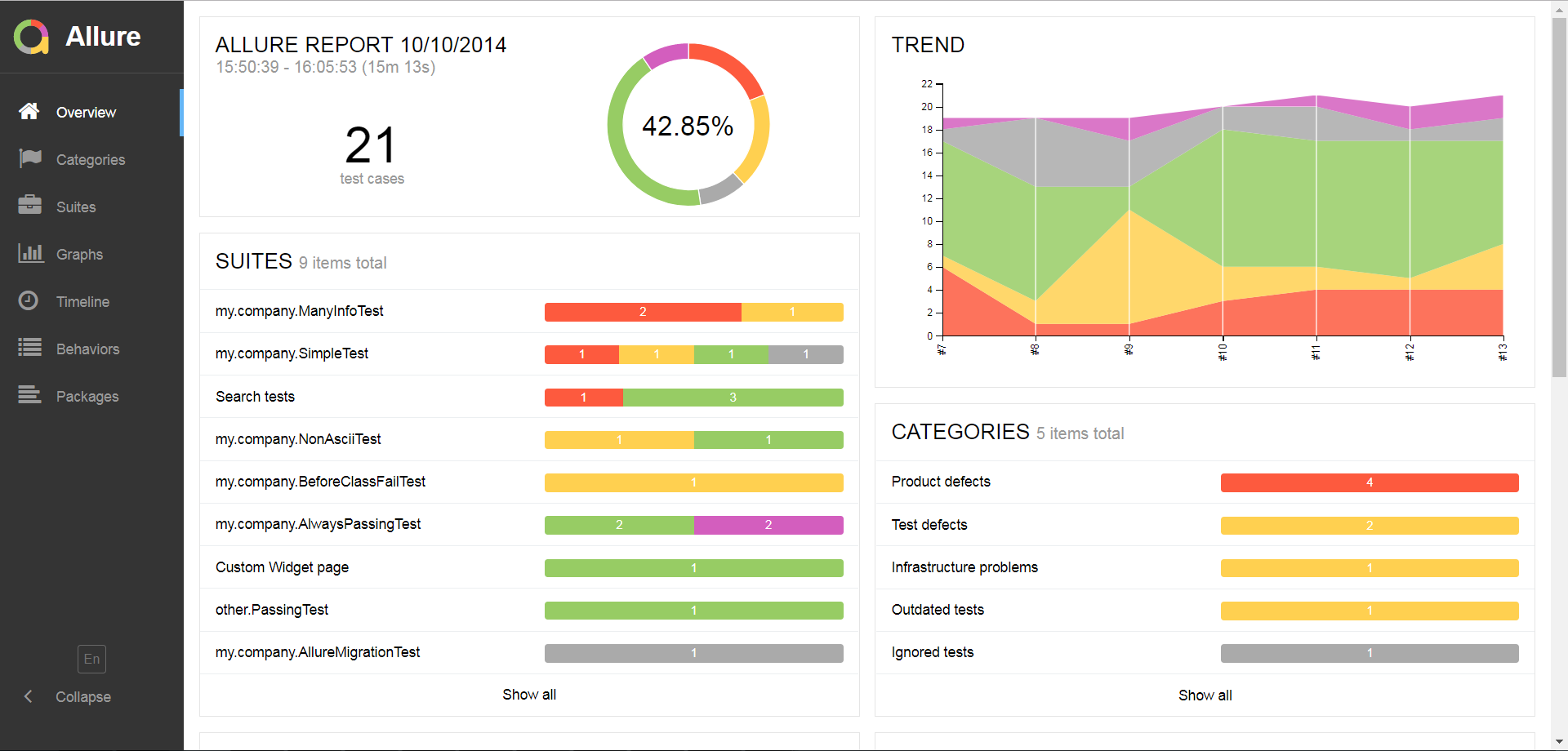-
Notifications
You must be signed in to change notification settings - Fork 11
Allure
[[Allure|https://github.com/allure-framework/allure2]] is a test report tool that creates a nifty HTML report out of test execution results. Allure brings also some Java programming features that allows you to determine steps, add parameters and attachments to enhance the created report. See more their documentation for more details Allure documentation
 Check out their demo report
Check out their demo report
Reports are generated via Maven command mvn clean test allure:report which will clean the project, execute tests and finally generates the report from test results. Since Allure writes their own test results besides JUnit results the tool needs to be integrated into test cycle. Maven Surefire is a Maven plugin which covers test phase in lifecycle. You need to add the following configuration to your pom.xml in order to get Allure reports working.
<properties>
<project.build.sourceEncoding>UTF-8</project.build.sourceEncoding>
<maven.compiler.source>1.8</maven.compiler.source>
<maven.compiler.target>1.8</maven.compiler.target>
<aspectj.version>1.8.10</aspectj.version>
</properties>
<build>
<plugins>
<plugin>
<groupId>org.apache.maven.plugins</groupId>
<artifactId>maven-surefire-plugin</artifactId>
<version>2.20.1</version>
<configuration>
<forkCount>4</forkCount><!-- parallel test execution -->
<reuseForks>false</reuseForks>
<argLine>-javaagent:"${settings.localRepository}/org/aspectj/aspectjweaver/${aspectj.version}/aspectjweaver-${aspectj.version}.jar"</argLine>
<properties>
<property>
<name>listener</name>
<value>io.qameta.allure.junit4.AllureJunit4</value>
</property>
</properties>
<systemProperties>
<property>
<name>allure.results.directory</name>
<value>${project.build.directory}/allure-results</value>
</property>
</systemProperties>
</configuration>
<dependencies>
<dependency>
<groupId>org.aspectj</groupId>
<artifactId>aspectjweaver</artifactId>
<version>${aspectj.version}</version>
</dependency>
<dependency>
<groupId>org.apache.maven.surefire</groupId>
<artifactId>surefire-junit47</artifactId>
<version>2.20.1</version>
</dependency>
</dependencies>
</plugin>
<plugin>
<groupId>io.qameta.allure</groupId>
<artifactId>allure-maven</artifactId>
<version>2.9</version>
<configuration>
<reportVersion>2.4.1</reportVersion>
</configuration>
</plugin>
</plugins>
</build>Defining steps
There are different ways to define steps of your test case that are later on visible in the report. First you can define functions that are annotated. The @Step annotation on that method causes the
@Step("FirstStep")
public void myFirstStep()
{
// do stuff
}public void myTest()
{
step("first step");
// do stuff
step("second step");
// do stuff
}
@Step("\"{stepName}\" step")
public void step(String stepName)
{
}Overview
Neodymium features
- Neodymium configuration properties
- Neodymium context
- Utility classes
- Test data provider
- Test Environments
- Multi browser support
- Applitools Plugin
- Localization
- Highlight and Wait
- Advanced Screenshots
- Seperate Browser Sessions for Setup and Cleanup
Best practices and used frameworks
Special